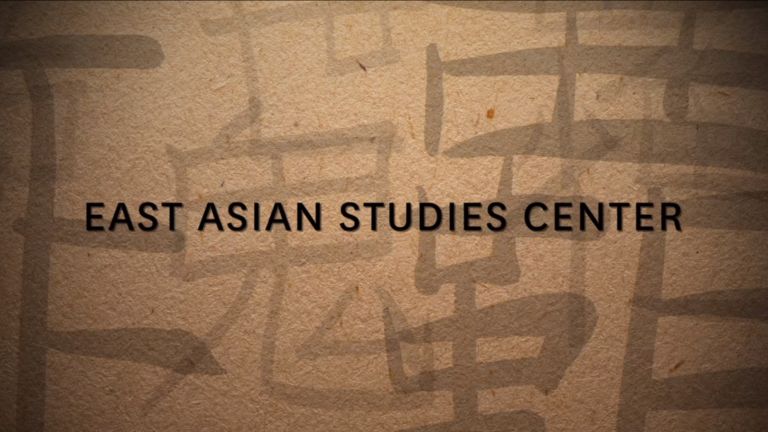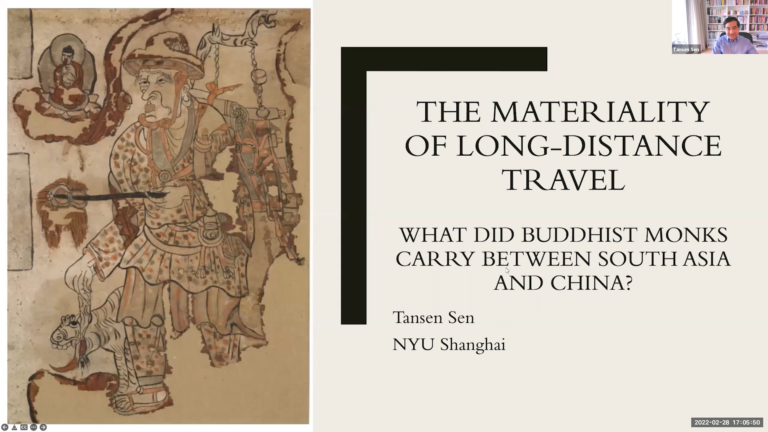East Asian Studies Center
Videos
Filter
March 21, 2024 | This panel discussion titled, "Toyota, Sony, and Sushi: Nisei and the Japan Boom in the US," sheds light on the often-overlooked involvement of second-generation Japanese Americans in facilitating this rise of Japanese exports.
America’s current love affair with Japanese consumer products, popular culture, and tastes stems from an era just after World War II that produced the “Japan Boom.” This panel highlights and explores the hidden role that second-generation Japanese Americans (Nisei) played in this boom in Japanese exports. What were Japan’s postwar export strategies and how and why did Nisei contribute to them as ethnic brokers paving the way for fledging companies such as Toyota and Sony, and new tastes such as sushi to enter the US market?
Each of the panelists addresses a different part of this question. Professor Saori Katada lays out the context of postwar Japan’s international and domestic economic policies. Jon Kaji and Shawn Layden addresses the crucial role played by Nisei for Toyota and Sony, respectively. Atsuko Kanai discusses her Nisei father Noritoshi Kanai and his role in birthing the sushi boom in the US through his business Mutual Trading Company. Finally, Professor Lon Kurashige chairs the panel and introduces the themes connecting the panelists’ talks.
Panelists: Jon Kaji, Shawn Layden, Atsuko Kanai, Saori Katada, and Lon Kurashige.
The Materiality of Long-Distance Travel: What did Buddhist Monks Carry between South Asia and China?
March 4, 2022 | The travels of Buddhist monks (and, in some instances, nuns) between South Asia and China facilitated the circulation of ideas, knowledge, and objects. The writings of Chinese Buddhist monks Faxian, Xuanzang, and Yijing have detailed the perilous nature of such travels and pointed to the diverse itineraries these monks took. While there have been numerous studies on the travels of these and other monks, the examination of what they carried during their arduous journeys is still to be examined in detail. This presentation focuses on the daily necessities, gifts, texts, and other items Buddhist travelers carried with them as they traveled through overland and maritime routes. The aim is to explore and formulate a conceptual framework for the materiality of long-distance travel as well as the agency of objects in the Buddhist connections between South Asia and China.
February 23, 2022 | In this new era of rapid transitions, from onsite to remote and paper to digital platforms, we have an unprecedented opportunity to reimagine the way we approach many activities, including how new therapeutics are developed for a global population. Now more than ever, topics like regulatory convergence and harmonization, decentralized clinical trials, artificial intelligence, mobile health, and remote data capture are explored to reduce duplication of efforts, reuse data from one jurisdiction for another, and include historically under-represented populations in the clinical trial process. The seminar, hosted by USC East Asian Studies Center, is an overview of this dynamic topic with a special regional focus on East Asia.
November 1, 2021 | For decades, historians have debated the question of whether concepts equivalent to race and racism existed in premodern Chinese ethnic discourse. Unfortunately, this discussion has been hindered by reliance on an inadequate nineteenth-century practice of classifying identities as racial, cultural, or national. In this talk, Professor Yang proposes a new conceptual framework for analyzing imperial Chinese ethnic discourses and argue that certain discourses previously characterized as racist could be more usefully interpreted as two distinct but related traditions of foreign relations thinking that he terms “civilization-state discourse” and “Chinese supremacism.” He also argues that “structural/systemic/institutional racism”—as understood by critical race theory (CRT) scholars in terms of institutionalized, legally enforced hierarchies of ethnic inequality within a state—did not exist in periods when the “Han” Chinese majority was dominant but did exist in some periods of minority (e.g., Mongol and Manchu) rule, albeit in a form mitigated by universalistic official rhetoric.
April 8, 2021 | As part of the 2020-21 EASC Guest Speaker Series, USC Assistant Professor of Religion, Jessica Zu has invited Dr. Larry Ward, co-founder of The Lotus Institute and author of America’s Racial Karma: An Invitation to Heal. This lecture will tie in Prof. Zu's REL 342: Buddhist Modernism. This course seeks to cover not only the common perception of Buddhism as psychological therapy, McMindfulness style of self-help, and part of the New Age Spirituality but also the less studied engaged Buddhism that sought to make Buddhism a civil religion.
Engaged Buddhism is an important branch of new Buddhist movements that emerged around the world in the mid-twentieth century. However, in America today, engaged Buddhists seem to have poised to become the leaders in using Buddhist spirituality to fight for social justice, to cure collective racial trauma, and to dismantle lasting structural oppressions.
March 18, 2021 | As part of the 2020-21 EASC Guest Speaker Series, USC Postdoctoral Scholar and Teaching Fellow in the Department of Political Science & International Relations, Hao Chen has invited Yuhua Wang, Frederick S. Danziger Associate Professor in the Department of Government (Harvard University). This lecture, The Rise, Fall, and Rise of China, will tie in with Dr. Chen's IR 340; The Political Economy of China course. The course surveys the political and economic development of the People’s Republic of China from 1949 to very recently, the Xi Administration and highlights the interaction between the state and business in the reform era (1978 - present).
Professor Wang is a leading scholar in the field of China studies and has published extensively on state-business relations in contemporary China. His research has focused on the emergence and constraints of state institutions, with a regional focus on China and is the author of Tying the Autocrat’s Hands: The Rise of the Rule of Law in China (Cambridge University Press, 2015). In the article published in The China Quarterly, “Beyond Local Protectionism: China’s State-Business Relations in the Last Two Decades,” he conducted a large-scale, systematic study on all Chinese public listed firms from 1993 to 2012 and challenged the popular argument that businesses in China have primarily relied on ties with local governments. He is currently working on a new book "The Rise and Fall of the Chinese State, 618-1911" (under contract at Princeton University Press) to examine the long-term state development in China.






